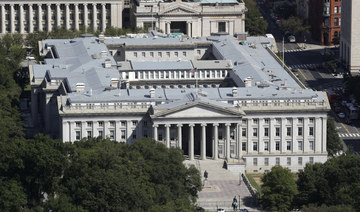WASHINGTON: Federal authorities expressed increased alarm Thursday about a long-undetected intrusion into US and other computer systems around the globe that officials suspect was carried out by Russian hackers. The nation’s cybersecurity agency warned of a “grave” risk to government and private networks.
The hack compromised federal agencies and “critical infrastructure” in a sophisticated attack that was hard to detect and will be difficult to undo, the Cybersecurity and Infrastructure Security Agency said in an unusual warning message. The Department of Energy acknowledged it was among those that had been hacked.
The attack, if authorities can prove it was carried out by Russia as experts believe, creates a fresh foreign policy problem for President Donald Trump in his final days in office.
Trump, whose administration has been criticized for eliminating a White House cybersecurity adviser and downplaying Russian interference in the 2016 presidential election, has made no public statements about the breach.
President-elect Joe Biden, who will inherit the potentially difficult US-Russia relationship, spoke up forcefully about the hack, declaring that he and Vice President-elect Kamala Harris “will make dealing with this breach a top priority from the moment we take office.”
“We need to disrupt and deter our adversaries from undertaking significant cyberattacks in the first place,” he said. “We will do that by, among other things, imposing substantial costs on those responsible for such malicious attacks, including in coordination with our allies and partners.”
“There’s a lot we don’t yet know, but what we do know is a matter of great concern,” Biden said. He thanked administration “public servants” who he said were “working around-the-clock to respond to this attack.”
CISA officials did not respond to questions and so it was unclear what the agency meant by a “grave threat” or by “critical infrastructure” possibly targeted in the attack that the agency previously said appeared to have begun last March. Homeland Security, the agency’s parent department, defines such infrastructure as any “vital” assets to the US or its economy, a broad category that could include power plants and financial institutions.
The agency previously said the perpetrators had used network management software from Texas-based SolarWinds to infiltrate computer networks. Its new alert said the attackers may have used other methods, as well.
Tech giant Microsoft, which has helped respond to the breach, revealed late Thursday that it’s been working to notify more than 40 organizations that were compromised using “additional and sophisticated measures” beyond the back door into SolarWinds systems. Microsoft said most of the compromised customers are in the United States, with victims also in Canada, Mexico, Belgium, Spain, the United Kingdom, Israel and the United Arab Emirates.
Over the weekend, amid reports that the Treasury and Commerce departments were breached, CISA directed all civilian agencies of the federal government to remove SolarWinds from their servers. The cybersecurity agencies of Britain and Ireland issued similar alerts.
A US official previously told The Associated Press that Russia-based hackers were suspected, but neither CISA nor the FBI has publicly said who is believed to be responsible. Asked whether Russia was behind the attack, the official said: “We believe so. We haven’t said that publicly yet because it isn’t 100% confirmed.”
Another US official, speaking Thursday on condition of anonymity to discuss a matter that is under investigation, said the hack was severe and extremely damaging although the administration was not yet ready to publicly blame anyone for it.
“This is looking like it’s the worst hacking case in the history of America,” the official said. “They got into everything.”
At the Department of Energy, the initial investigation revealed that malware injected into its networks via a SolarWinds update has been found only on its business networks and has not affected national security operations, including the agency that manages the nation’s nuclear weapons stockpile, according to its statement. It said vulnerable software was disconnected from the DOE network to reduce any risk.
The intentions of the perpetrators appear to be espionage and gathering information rather than destruction, according to security experts and former government officials. If so, they are now remarkably well situated.
Thomas Bossert, a former Trump Homeland Security adviser, said in an opinion article in The New York Times that the US should now act as if the Russian government had gained control of the networks it has penetrated. “The actual and perceived control of so many important networks could easily be used to undermine public and consumer trust in data, written communications and services,” he wrote.
Members of Congress said they feared that taxpayers’ personal information could have been exposed because the IRS is part of Treasury, which used SolarWinds software. Experts involved in the hack response say the intruders are not likely interested in such data because they are intelligence agents narrowly focused on sensitive national security data — and trying to steal taxpayer info would likely set off alarms.
Tom Kellermann, cybersecurity strategy chief of the software company VMware, said the hackers are now “omniscient to the operations” of federal agencies they’ve infiltrated “and there is viable concern that they might leverage destructive attacks within these agencies” now that they’ve been discovered.
Among the business sectors scrambling to protect their systems and assess potential theft of information are defense contractors, technology companies and providers of telecommunications and the electric grid.
A group led by CEOs in the electric power industry said it held a “situational awareness call” earlier this week to help electric companies and public power utilities identify whether the compromise posed a threat to their networks.
And dozens of smaller institutions that seemed to have little data of interest to foreign spies were nonetheless forced to respond to the hack.
The Helix Water District, which provides drinking water to the suburbs of San Diego, California, said it provided a patch to its SolarWinds software after it got an advisory the IT company sent out about the hack to about 33,000 customers Sunday.
“While we do utilize SolarWinds, we are not aware of any district impacts from the security breach,” said Michelle Curtis, a spokesperson for the water district.
Hack against US is ‘grave’ threat, cybersecurity agency says
https://arab.news/2j4rm
Hack against US is ‘grave’ threat, cybersecurity agency says

- The hackers, suspected to be Russian spies, gained control of the networks via the SolarWinds cybersecurity software
- Tech giant Microsoft, which has helped respond to the breach,t said most of the compromised customers are in the US
Businesswoman set to become Iceland’s next president

- Halla Tomasdottir was officially credited with 34.6% of votes, after 71.6% of ballot papers had been counted
- Iceland’s president holds a largely ceremonial position in the parliamentary republic
Jakobsdottir conceded defeat early on Sunday and congratulated Tomasdottir, the CEO of The B Team, a global non-profit co-founded by UK business tycoon Richard Branson to promote business practices focused on humanity and the climate.
Iceland’s president holds a largely ceremonial position in the parliamentary republic, acting as a guarantor of the constitution and national unity.
He or she does however have the power to veto legislation or submit it to a referendum.
Tomasdottir, 55, was officially credited with 34.6 percent of votes, after 71.6 percent of ballot papers had been counted on Sunday.
The 48-year-old Jakobsdottir, who stepped down as prime minister of a left-right government in April to run in Saturday’s election, garnered 25 percent.
The results showed Tomasdottir with much stronger support than opinion polls had suggested in the run-up to the election, where the two candidates had been seen running neck-and-neck.
The final results were likely to change somewhat but Jakobsdottir conceded defeat in the early hours of Sunday before the last votes were in.
“It seems to me that Halla Tomasdottir is quickly heading toward becoming the next president of Iceland.
“I congratulate her on that and know that she will be a good president,” Jakobsdottir told national broadcaster RUV at an election night rally.
Tomasdottir meanwhile told daily Morgunbladid during her election rally she was “just trying to breathe.”
“I feel incredibly good. I know it’s not over until it’s over. So I’m also just trying to stay calm and breathe,” she said.
Tomasdottir is also the founder of Audur Capital, an investment firm created in 2007 aimed at promoting feminine values in the financial sector.
No one central issue dominated the campaign, where candidates traditionally run as independents without party affiliations.
In the country of 380,000 people, any citizen gathering 1,500 signatures can run for office.
While Jakobsdottir was at times seen as the favorite, political observers had suggested that her background as prime minister could weigh against her.
Among the other main candidates in the field of 13 were a political science professor, a comedian, and an Arctic and energy scholar.
Tomasdottir is set to be the second woman to serve as Iceland’s president.
In 1980, Vigdis Finnbogadottir became the world’s first woman democratically elected as head of state.
The businesswoman is set to succeed the hugely popular Gudni Johannesson, who has held the job since 2016.
He announced earlier this year that he would not seek re-election.
Jakobsdottir, party leader for the Left Green Movement from 2013 until her presidential bid, has been hailed for her handling of the resurgence in volcanic eruptions on the Reykjanes peninsula since December.
The five eruptions, including one last week, have sparked a series of evacuations as well as the state’s acquisition of homes from residents evacuated from the threatened fishing town of Grindavik.
Rescue crews work to free people trapped under a collapsed apartment building in Istanbul

ISTANBUL: Emergency workers were trying to rescue people trapped under a collapsed apartment building in Istanbul on Sunday.
TV images showed firefighters shifting rubble by hand from the flattened three-story building in Kucukcekmece on the city’s European side. Two injured people were pulled from the debris, broadcaster CNN Turk reported.
The Istanbul governor’s office said the structure collapsed at 8:40 a.m. local time (0545 GMT). The cause was not immediately clear.
More than 59,000 people were killed last year when a magnitude 7.8 earthquake struck parts of southern Turkiye and neighboring Syria. The disaster highlighted the poor enforcement of building regulations in Turkiye.
Heatstroke killed 33 Indian polling staff on last voting day— state election chief

- Security guards, sanitation staff included among 33 Indian polling staff who died from heat
- Indian PM Modi expected to win third successive landslide election after results are announced
Lucknow, INDIA: At least 33 Indian polling staff died on the last day of voting from heatstroke in just one state, a top election official said Sunday, after scorching temperatures gripped swathes of the country.
While there have been reports of multiple deaths from the intense heatwave — with temperatures above 45 degrees Celsius (113 degrees Fahrenheit) in many places — the dozens of staff dying in one day marks an especially grim toll.
The India Meteorological Department (IMD) said temperatures at Jhansi in Uttar Pradesh reached 46.9 degrees Celsius (116 Fahrenheit).
Navdeep Rinwa, chief electoral officer for the northern state of Uttar Pradesh, where voting in the seventh and final stage of elections ended Saturday, said 33 polling personnel died due to the heat.
The figure included security guards and sanitation staff.
“A monetary compensation of 1.5 million rupees ($18,000) will be provided to the families of the deceased,” Rinwa told reporters.
Experts say that when a person is dehydrated, extreme heat exposure thickens their blood and causes organs to shut down.
Rinwa reported a separate incident in which a man queueing to vote in the city of Ballia lost consciousness while waiting in line.
“The voter was transported to a health facility, where he was pronounced dead upon arrival,” Rinwa said.
India is no stranger to searing summer temperatures.
But years of scientific research have found climate change is causing heatwaves to become longer, more frequent and more intense.
Hindu-nationalist Prime Minister Narendra Modi looks set to win a third straight landslide election victory after voting ended on Saturday.
Exit polls showed he was well on track to triumph and Modi himself was certain he had prevailed.
The results will be formally announced on Tuesday.
Heatstroke kills 33 Indian polling staff on last voting day: state election chief

- Navdeep Rinwa, chief electoral officer for the northern state of Uttar Pradesh, where voting in the seventh and final stage of elections ended Saturday, said 33 polling personnel died due to the heat
LUCKNOW: At least 33 Indian polling staff died on the last day of voting from heatstroke in just one state, a top election official said Sunday, after scorching temperatures gripped swathes of the country.
While there have been reports of multiple deaths from the intense heatwave — with temperatures above 45 degrees Celsius (113 degrees Fahrenheit) in many places — the dozens of staff dying in one day marks an especially grim toll.
The India Meteorological Department (IMD) said temperatures at Jhansi in Uttar Pradesh reached 46.9 degrees Celsius (116 Fahrenheit).
Navdeep Rinwa, chief electoral officer for the northern state of Uttar Pradesh, where voting in the seventh and final stage of elections ended Saturday, said 33 polling personnel died due to the heat.
The figure included security guards and sanitation staff.
“A monetary compensation of 1.5 million rupees ($18,000) will be provided to the families of the deceased,” Rinwa told reporters.
Experts say that when a person is dehydrated, extreme heat exposure thickens their blood and causes organs to shut down.
Rinwa reported a separate incident in which a man queueing to vote in the city of Ballia lost consciousness while waiting in line.
“The voter was transported to a health facility, where he was pronounced dead upon arrival,” Rinwa said.
India is no stranger to searing summer temperatures.
But years of scientific research have found climate change is causing heatwaves to become longer, more frequent and more intense.
Hindu-nationalist Prime Minister Narendra Modi looks set to win a third straight landslide election victory after voting ended on Saturday.
Exit polls showed he was well on track to triumph and Modi himself was certain he had prevailed.
The results will be formally announced on Tuesday.
China says it saw armed Philippine personnel on vessel in disputed South China Sea

- A 29-second video appeared to show a masked man momentarily holding up a blurred black object that resembled a rifle
BEIJING: Chinese state media said on Sunday that personnel on a Philippine ship pointed guns at China’s Coast Guard in disputed waters of the South China Sea last month.
At least two personnel on the Philippine vessel near the Second Thomas Shoal were carrying guns on deck, pointing them in the direction of China’s Coast Guard, CCTV said in a social media post.
An accompanying 29-second video appeared to show a masked man momentarily holding up a blurred black object that resembled a rifle.
China claims almost the entire South China Sea, a conduit for more than $3 trillion of annual ship-borne commerce, including parts claimed by the Philippines, Vietnam, Indonesia, Malaysia and Brunei. The Permanent Court of Arbitration in 2016 said China’s claims had no legal basis.
CCTV said the alleged incident occurred during a Philippine mission to supply troops. The troops are stationed on a rusting warship that Manila grounded in 1999 to reinforce its sovereignty claims.
The Philippine navy, coast guard and National Security Council, as well as the country’s embassy in Beijing did not immediately respond to requests for comment.
Philippine President Ferdinand Marcos Jr, in a speech on Friday attended by China’s defense minister, made a thinly veiled reference to Beijing, denouncing what he called illegal, coercive and aggressive actions in the South China Sea, which were undermining Southeast Asian countries’ a vision for “peace, stability and prosperity” in the sea.
Confrontations between the Philippines and China in the South China Sea have grown more tense and frequent during the past year, including China’s Coast Guard using water cannons and accusations by Manila that it had rammed Philippine vessels.


















